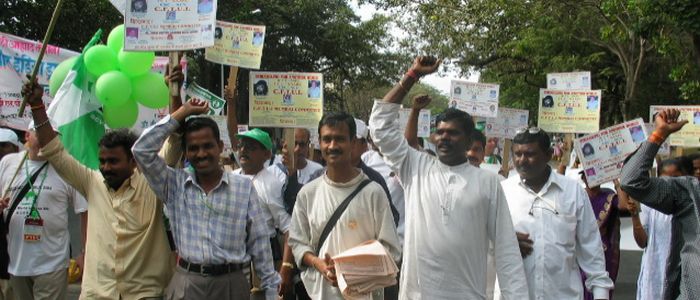The years of governments abrogating their responsibilities to govern must end. Banks and financial speculators can no longer be allowed to rule the world economy, or to simply send the bill to governments when their incompetence and greed throws the world economy into chaos. Those who have profited so much and for so long from the destruction of livelihoods and the plunder of the earth’s resources must be held to account, and those responsible for economic crimes must pay the penalty.
Trillions of dollars have been spent by governments to rescue the banks. Yet even in the depths of this recession, vast sums of money are being sucked out of the economy once more by bankers and financiers without regard to the damage they do. Currencies are under attack, multi-million dollar bonuses have returned and financial speculation is again rife, while the real economy is starved of the means to sustain and create employment. The global casino remains open for business, and it is ordinary people who are still paying the price, as their economic futures are bought and sold to satisfy the avarice of others. Meanwhile, the gap between rich and poor continues to widen, on top of years of growing inequality which itself helped cause the crisis.
Governments have to meet their obligations to govern in the interests of the people, to put finance at the service of the real economy, create decent jobs and ensure that all employers respect the rights of working people. They must reclaim, by taxing banks and finance, the wealth that is needed to put the world economy in order and to meet the costs of defeating poverty and stopping catastrophic climate change. If governments fail in these duties, and neglect the needs of the vulnerable and the marginalised, social conflict on a scale not seen for decades is sure to become a reality.
We demand that government return to centre stage, that the erosion of democracy in the name of capital be turned around, and that those who have taken and continue to hold power through undemocratic means submit to the will of the people. Every person must be empowered to fulfill their aspirations, for themselves and the coming generations. They must be given the chance to build decent lives through decent work and through public services that meet their needs.
It is governments that rescued the global financial system, working together to fix the mess caused by their own roll-back of regulation and the greed of bankers. Governments now need to stay the course. They must reject the demands to withdraw support for fragile economies and make devastating cuts in public expenditure. They have to move together without any further delay to control and regulate finance. The alternative is another, deeper, recession bringing even greater human misery.
The huge deficit in democratic global governance is not limited to the continuing economic crisis. With the abject failure of governments at the Copenhagen Climate Summit, the earth is still accelerating towards catastrophic climate change. The need for a far-reaching, just transition to a green world economy is thus more urgent by the day. Governments have the power, but must also have the will, to pull the world back from the brink of environmental disaster.
The impacts of climate change will hit hardest in the developing world, adding to the appalling record of neglect of the needs of the poorest countries and the failure to meet the targets set and the pledges made by richer countries to end world poverty. A new international agenda for development is required, one which helps the world’s poorer countries lift themselves out of poverty, build democracy, accountability and respect for human and trade union rights, and create decent, sustainable jobs for all.
The structures and policies of the World Bank, IMF and WTO must be fundamentally transformed to put decent work at their centre and support a resurgence of democratic accountability and governance in every country and at the global level. The ILO must be at the centre of new international governance which works in the interests of the people, and which ensures a sustainable and equitable future for humankind.
The trade unions of the world have stepped forward to meet this crisis head-on. We have mobilised to demand fundamental reform, and taken up the cause of working women and men at the G20, the United Nations and right across the global institutions. We will carry forward our campaign for global justice, to dismantle the edifice of corruption and excess and to build afresh. Out of this crisis, a new global economy must be created, which:
• Delivers decent work, with full respect for trade union rights, to all;
• Is based on effective, democratic and accountable global governance which prioritises the needs of people first;
• Ensures strong financial regulation, putting finance at the service of the real economy and the real economy at the service of people;
• Guarantees respect for the rights of all working women and men and brings an end to poverty, inequality, discrimination and exploitation; and
• Secures sustainability though green investment and green jobs.
The challenge before us is as great as any that trade unions have faced at any time. We have pride and confidence in our tradition of solidarity which is stronger today than ever, and which gives us the foundation for turning our aspiration for a world based on democracy, justice, equality and sustainability into a reality.
The ITUC represents 176 million workers in 155 countries and territories and has 312 national affiliates. http://www.youtube.com/ITUCCSI
For more information, please contact the ITUC Press Department on: +32 2 224 0204 or +32 476 621 018.


